January/February 2022
Dear Friends,
We hope this publication of the Fellow’s flyer finds you and your family doing well. Princeton in Africa is proud to announce that many of our Fellows have reached the six-month mark of their fellowships. We are grateful for their inspired hard work, passion, and understanding during the first half of their fellowships.
On another note, Princeton in Africa staff worked tirelessly throughout the 2022 interview sessions in January in order to speak with all candidates for the 2022-23 fellowship year. We wish our candidates all the best as they continue on in the placement process. We look forward to meeting our next cohort!
In this edition of our Fellows Flyer, we feature articles from four of our Fellows, and a special highlight of Jasmin Church, our Princeton in Africa Alumni Board President, in appreciation of Black History Month. We hope our followers and supporters have taken the time to educate themselves about this year’s Black History Month theme- Black Health and Wellness, as well as celebrate Black history, achievement, and excellence. Visit our social media platforms to view highlights of our health-care oriented host organizations, Black-led host organizations, and Black alumni.
Be sure to follow our Princeton in Africa Instagram to see upcoming Black History Month highlights as well as more information about the work of our Fellows. Our Fellows regularly take over our Instagram page to give details about their day-to-day work, their organizations, and their work-from-home lives.
Last month, we had the great pleasure of inviting three esteemed experts in the field of public health and economic development to our January 27th event, The Covid-19 Pandemic: Health and Economic Impact, Responses, and Lessons from Africa. We welcomed Dr. Ahmed Ogwell Ouma (Deputy Director of Africa Centres for Disease Control and Prevention (Africa CDC)), Dr. Brahima S. Coulibaly (Vice President and Director of Global Economy and Development at The Brookings Institution), and Dr. Mogomotsi Matshaba (Executive Director of Botswana-Baylor Children’s Clinical Centre of Excellence). They crafted a rich conversation about the pandemic’s impact as we enter into the third year and the future projections for the African Continent. If you missed it, please visit our youtube channel to view a recording of the informative event. These speaker series events, featuring esteemed guests and experts on African affairs, will be held quarterly. Please stay tuned, and join PiAf in these future events.
We want to extend a warm thank you to all the alumni, donors, and friends who offer continuous support to the Fellows and host organizations. Looking forward, we are excited to explore more African thought leadership and innovation, watch as our current fellowship cohort continues to grow and achieve, and welcome a new cohort later in the year.
Warm regards,
Damilola and The PiAf team
PiAf Connections
Please click below to check out pictures of our Fellows, Alums and other members of the PiAf family meeting up at home and around Africa.
Notes from the Field
By Elliot Carleton, '21-'22 Fellow with International Livestock Research Institute in Kenya
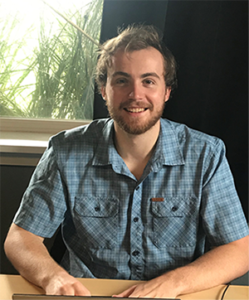
Elliot working remotely
Hello PiAf family! My name is Elliot Carleton, and I have been working as a Fellow with the International Livestock Research Institute (ILRI) in Nairobi, Kenya for about five months now. It is hard to believe that I am almost halfway through my fellowship. I can still remember the excitement I experienced on that day in late April when I opened my email and saw that I had been accepted as a Fellow at ILRI. In fact, the excitement has never really worn off—I have been grateful every day since for all the opportunities ILRI and PiAf have provided me.
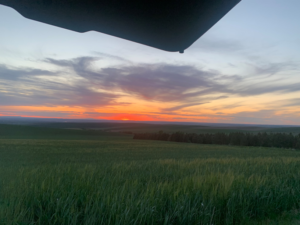
Chasing the sunset in Walla Walla, Washington (where Elliot went to college)
Despite working virtually this year, the opportunities for personal and professional growth have been limitless. I certainly experienced a steep learning curve during my first couple of months at ILRI, but everyone I work with has been incredibly supportive and encouraged me to take on new and greater responsibilities. My day-to-day as a PiAf fellow varies, but my main tasks include writing blogs/reports, creating social media posts, and co-hosting ILRI’s podcast, The Boma, with my wonderful co-fellow Brenda.
While many of my writing tasks started out small, I have been given much more responsibility as of late. One of my main projects right now is to create the communications materials (reports, briefs, and blogs) for the conclusion of ILRI’s decade-long participatory rangeland management project in Ethiopia, Kenya, and Tanzania. The project seeks to help pastoral communities sustainably manage their rangelands and minimize the violent resource conflicts that have plagued parts of East Africa recently. I could not have imagined working on a project of this scale at the start of my fellowship, but it has been really exciting to see myself grow into new roles and responsibilities.
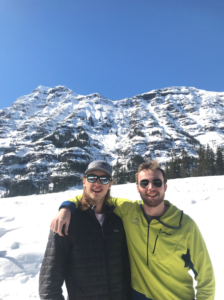
Visiting Yellowstone with friends
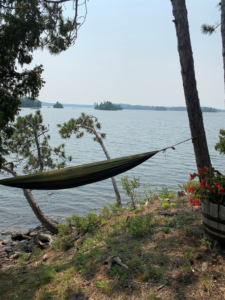
Elliot’s remote working set up in Minnesota
While I have still never had the chance to travel to the African continent given the virtual nature of my work, my time with ILRI has allowed me to make meaningful contributions to a variety of regional issues surrounding the environment, health, agriculture, and economic development. Through these work experiences, I have come to feel more connected to the people, places, and nations of Africa. I remain excited about the future opportunities for travel and work on the continent my time as a PiAf fellow will help to unlock.
When I take time to reflect on where I was five months ago, it is remarkable to see how far I have come already during my fellowship. I have been fortunate to develop great connections with my colleagues, acquire new interests such as podcasting, and work on the global issues that I care about the most. It is a tremendous privilege to be a part of the PiAf community, and given the growth, I have experienced so far, I could not be more excited for what the next seven months have in store.
Notes from the Field
By Rowan Sharkey, '21-'22 Fellow with Alliance of Bioversity International and CIAT
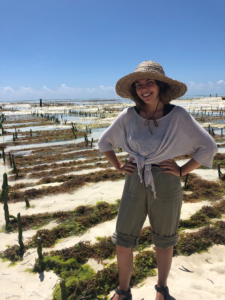
Working on a seaweed farm in Tanzania (2020)
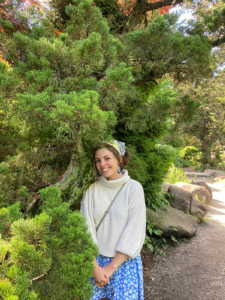
Taking daily walks in between meetings
Greetings from Ohio! Starting in July, I have been working with the Alliance of Bioversity and CIAT based in Nairobi, Kenya. The goal of Alliance is to address global challenges of poverty, malnutrition, climate change, land degradation, and biodiversity loss. The organization provides research-based solutions that utilize agricultural biodiversity in order to sustainably transform food systems. By creating food systems and landscapes that sustain the planet, people across the world are provided with stable food security.
I was onboarded originally as a Monitoring and Evaluation officer for the Africa hub. Therefore, I have worked with researchers to assess their impact and provide tools and resources to increase research efficiency. Having come from a background in data analytics, I was inspired to get more involved in the actual research aspect of the organization. I reached out to my supervisor asking if I could be put on any projects, and she graciously put me in touch with co-workers who conduct research on a variety of projects. In the past five months, I have aided my organization in conducting research on topics such as nutrition accessibility, sustainable farming practice dissemination, banana agronomy, and more. I have found myself utilizing software such as GIS, Python, and R studio to conduct spatial and statistical analyses of food systems across the continent. I am incredibly grateful for the amount of variety in my work as it allows me to develop and refine skills across a broad spectrum.
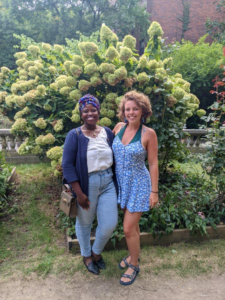
Met up with my co-fellow Gwladys in NYC
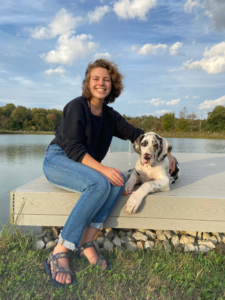
One perk of being home is I get to train my new puppy!
While I am fascinated by the analyses, my favorite part of my job is the people. While virtual, I still get to have fulfilling conversations with my co-workers and farmers regarding life on the continent. Being able to hear about the work-life of my co-workers has allowed me to develop a strong connection despite the distance. My co-workers have put in great effort to welcome me to the team and make me feel valued even while remote. I am inspired by the dedication and passion my team has exhibited for this organization and I strive to reach that level of excellence.
I greatly look forward to my remaining 6 months with the Alliance of Bioversity International and CIAT. I have learned more than I could have imagined and can’t wait to see what’s in store for these last few months! A huge thank you to PiAf and to the Alliance for hosting me!
Notes from the Field
By Chiedza Chinakwetu, '21-'22 Fellow with Lwala Community Alliance in Kenya
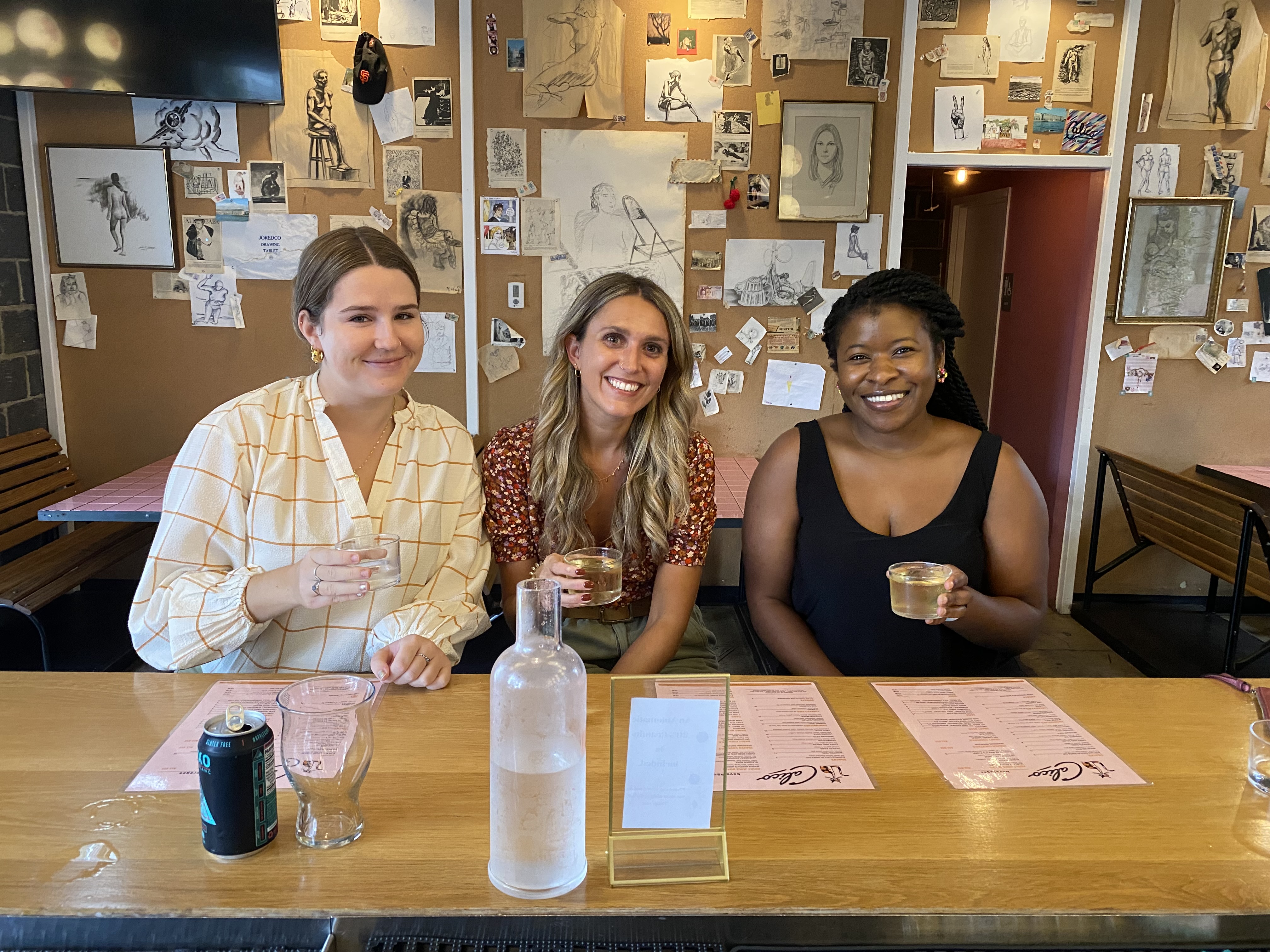
Chiedza and her Washington, DC-based colleagues at Happy Hour. They try to meet up every now and then.
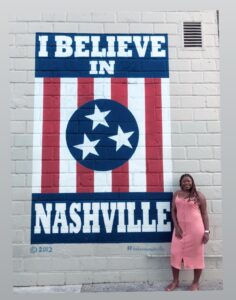
Chiedza visiting Lwala’s headquarters in Nashville for a staff retreat
As I approach the 8th-month point of my fellowship, I’ve spent a lot of time reflecting on my journey as a remote Communications and Learning Fellow at Lwala Community Alliance, a community development organization based in Kenya. I vividly remember the day I received my offer email from PiAf, the excitement, the mixed feelings of navigating the fellowship remotely, and the uncertainty of whether I will get the opportunity to transition to Western Kenya given the ongoing COVID-19 pandemic. Never in my wildest dreams could I have imagined learning and enhancing my skill set as much as I did in 8 months.
The experience has been both challenging and rewarding. I have had the opportunity to contribute to proposal development and grants management. I support the generation of high-quality content from our various program teams in Kenya for learning and reporting to our donors. I mostly work with the US team which is based in Nashville and Washington, DC. At the beginning of my fellowship, I had the opportunity to meet the US team in Nashville where we convened for a staff retreat. Never underestimate the empowering effect of connecting in person. Although the remote aspect comes with its challenges, I remind myself of how lucky I am to do meaningful, impactful work every day. I strive to stay motivated working remotely by practicing gratitude.
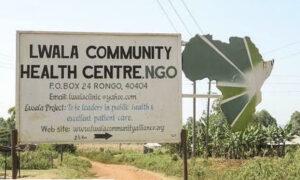
Lwala’s Kenyan headquarters.
My superiors at Lwala have been exceptional and inspiring. I have been learning from thought leaders in the field of global health who are not only passionate about the discipline but have a deep understanding of how it has evolved and will continue to evolve. Am grateful for the opportunity to work at Lwala because the organization has been a major force in refining the craft of the discipline. While I would love nothing more than be working in my intended destination in Rongo, Kenya, I have had the opportunity to work from many different places in the US during my fellowship.
As I wrap up, I send greetings to you from Washington, DC. I look forward to the rest of the fellowship and what it has to offer!
Notes from the Field
By Catherine Blizzard, '21-'22 Fellow with Mount Elgon Ecosystem Trust in Kenya
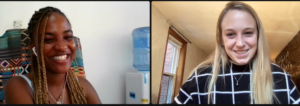
Catherine working on Zoom with her co-fellow, Haja
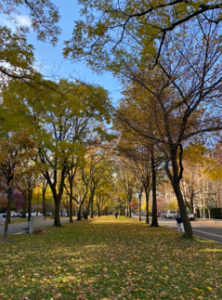
A pleasant fall afternoon walk after work
Greetings from Boston, Massachusetts! My name is Catherine Blizzard, and I have been working as a Grants and Fundraising Fellow for the El-Koony Center, a scientific research and community capacity-building center located in Western Kenya along the Kenya-Uganda border.
I can’t believe it’s been six months since I began my remote fellowship with the El-Koony Center. Within these months, I have had the incredible opportunity to connect with the PiAf community and work to help create the fundraising and development structure for a newly-founded nonprofit. I am grateful to work directly with the founder of the El-Koony Center to build up our various projects, and she has given me the chance to help with a variety of tasks, from website development to strategic planning. Although working remotely poses challenges, I’ve successfully worked on grant applications for our agricultural, ethnobotany, and elephant conservation projects, and I’ve had the opportunity to take proposal writing courses as well as speak with fundraising mentors from the U.S.
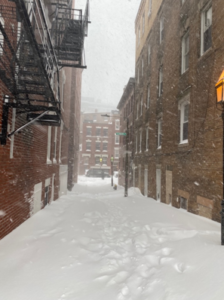
Working remotely from Boston during a recent Blizzard
Thanks to Zoom and WhatsApp, I have been able to work across three international time zones with my co-fellow in Sierra Leone and my supervisor in Kenya. By living vicariously through my co-fellow’s pictures of Freetown and my supervisor’s work in Kitale, I feel as connected as possible with the African continent and with my host organization in this virtual environment.
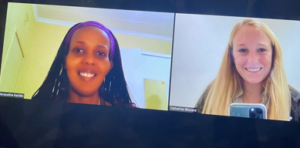
Catherine meeting with her supervisor via Zoom
Although I would have loved to connect in person with my team, I can confidently say that I feel integrated into my fellowship organization. As I begin the second half of my fellowship, I am pondering the question of how the pandemic has shifted the roles and norms of working for international organizations from another country. I will probably not have an answer for this question after my fellowship ends, but I hope to spend the next six months educating myself on the role of my work in Kenya and analyzing how I can make an equitable impact. Thanks for reading!
Notes from the Field
Alumni Interview: Jasmin Church, President of Princeton in Africa's Alumni Board

Jasmin Church, 2015-2016 Fellow with eleQtra, Uganda. Spelman College Class of 2010
As president of the PiAf alumni board, what impact do you hope to make on our organization and within the alumni community?
I want to strengthen the connections alumni have with each other, current fellows, and the network altogether. Living through a pandemic has been such a silent and even lonely challenge for people but I want alumni to feel connected to the PiAf family no matter where they are in the world. For PiAf as an organization, I want to push us to find more ways to connect with those we seek to “serve” and follow their lead for what change and service looks like for us.
How has your PiAf experience influenced your career path?
Living and working in Uganda for a year introduced me to the idea of a social impact as a viable and fulfilling career. There is a huge knowledge gap regarding the sector, especially if you are on a more traditional path. While in Uganda, I got accepted to an MBA program and mapped out a post-MBA plan that would allow me to pivot into impact. After Darden, I pursued nonprofit consulting and moved to Johannesburg, South Africa, where I’ve been for two years now.
What opportunities stand out to you for alumni to stay involved in the PiAf network & community?
The best opportunities for PiAf alumni to stay involved with the network are to volunteer to conduct interviews for prospective fellows, apply to become a mid-year retreat host to connect with current fellows, and look out for virtual Alumni meet-ups. The Alumni spotlight in the PiAf monthly newsletter is another good way to stay updated on all things Princeton in Africa.
What advice would you give the current cohort of Fellows, as well as the current candidates for the 2022-23 fellowship year?
To the current cohort: You have time so try your best to remain in the present – I know this can be a challenge. But when the time comes for the next steps, just focus on making your next move your best move. And don’t be afraid to reach out to alumni! We’ve been where you are and there’s always someone who has the insight you are seeking whether it’s a career move or navigating your fellowship. For 2022-23 candidates, have a solid understanding of where and why you should be doing work on the continent and brace yourself for a life-changing experience!







